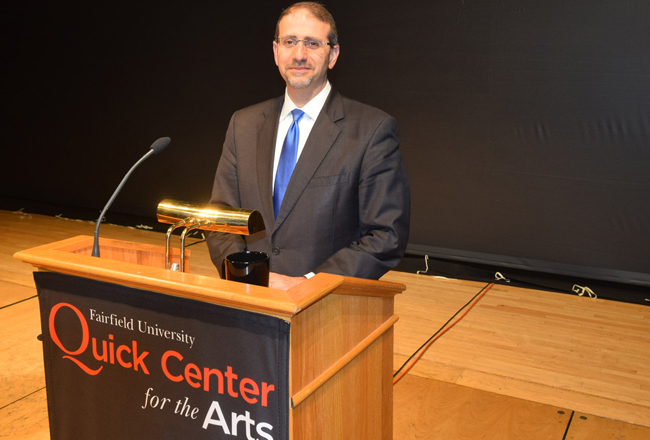Israel offers U.S. companies great economic opportunities, says former Ambassador Daniel Shapiro

Although Israel takes up a relatively small slice of the world map ”” its approximately 9 million people live in a country that is roughly the size of New Jersey ”” its economic attractiveness far exceeds its geographical limits, according to Daniel Shapiro, who served as U.S. ambassador to Israel during the Obama administration from 2011 to 2017.
In an exclusive interview with the Business Journal ahead of his March 26 appearance at Fairfield University”™s 2019 Bennett Lecture in Judaic Studies, Shapiro noted that while U.S. consumer goods companies can find traditional opportunities exporting to the Israeli market, the best economic potential for U.S. companies can be found in the nation”™s technology sector.
“The typical pattern has been an Israeli entrepreneur or innovator who will come out of the army with some technical skills and begin a startup with technology and apps that provides a solution to a problem,” Shapiro said. “A major American technology company like Microsoft or Google or Apple or IBM will spot them and will acquire the company, and make that the beginning of an R&D center. Technology companies have determined that there is so much quality innovation coming out of Israel that they cannot afford not to be there.”
The technologies being developed and expanded upon in Israel are diverse, Shapiro added, and include such varied fields as “automated transportation, clean energy, water conservation management and desalination, medical devices, medical marijuana ”” almost any discipline you can think of. If an American company is looking for technology solutions, they are likely to find them through Israeli innovators.”
Shapiro gave much of the credit for this wave of innovation to the Israeli government, which he estimated was “probably the No. 1 investor in R&D in the world.” But in more recent years, he observed, venture capital investors have also been making their presence known among the country”™s entrepreneurs.
Shapiro pointed out that U.S. businesses should also consider scouting out potential opportunities in the Palestinian Territories, although that area”™s economic potential is still a work in progress.
“It”™s challenging,” he explained. “There are political tensions, but there is definitely a nascent Palestinian innovation sector as well. It is linked, to some degree, with the Israeli technology sector, with Israeli companies setting up partnerships with Palestinian entrepreneurs, and some of that work is done remotely, but it is a cooperative enterprise.”
During his years as ambassador, Shapiro set up a U.S.-funded initiative to link American and Palestinian entrepreneurs that was modeled after the Binational Industrial Research and Development Foundation established in 1977 by the U.S. and Israeli governments. The goal of this initiative, Shapiro added, was to help strengthen the Palestinian economy as a strategy to help stabilize the region”™s political tensions. And while relations between the Trump administration and the Palestinian Authority have been frosty, Shapiro insisted that Palestinian entrepreneurs are able to envision the proverbial bigger picture.
“The Palestinian business community is very practical,” he said. “They are like businesspeople anywhere ”” they want to build a business, find export markets, attract investment, find partnerships, make a good living and improve their circumstances for their families and their communities. In my experience, there has never been a block for a Palestinian businessperson to work with an American partner simply because of the political situation between the governments.”
Shapiro also pointed out a growing trend of Israeli businesses coming to the U.S. to establish offices as a starting point for corporate expansion into the North American market. He recalled bringing multiple delegations of Israeli business leaders to the U.S. under the Department of Commerce”™s SelectUSA program to meet with state and local economic development authorities, and he observed that results of this endeavor are already being felt regionally: the New England-Israel Business Council issued a report in 2015 that found Israeli companies created 10,000 direct jobs and 20,000 indirect jobs in Massachusetts, accounting for 4.5 percent of the state”™s gross domestic product.
“And Israel is 0.1 percent of the world”™s population,” he said.
Not everyone is enamored about encouraging U.S.-Israel relations. Shapiro acknowledged efforts that have sought ”” unsuccessfully ”” to encourage divestment in Israel-based companies, but he remarked that these efforts would have been counterproductive if they were successful.
“If you were to divest from investment with Israeli companies, you would be cutting off your nose to spite your face,” he said. “You couldn”™t have the iPhone, you couldn”™t have most of the modern medical devices, you couldn”™t have communication or cybersecurity or water technologies. The world is flocking to Israel to take advantage of this.”
Shapiro also lamented recent comments made by U.S. Rep. Ilhan Omar (D-MN) regarding support for Israel within the U.S. political community. Shapiro stated that while Omar”™s remarks initially “had an anti-Semitic overlay,” he doubted they had any impact on U.S.-Israeli ties and he was optimistic that her verbiage would not be repeated.
“My hope is that she will do some learning and talking to her colleagues and constituents and maybe travel and start thinking about this situation a little differently,” he said.